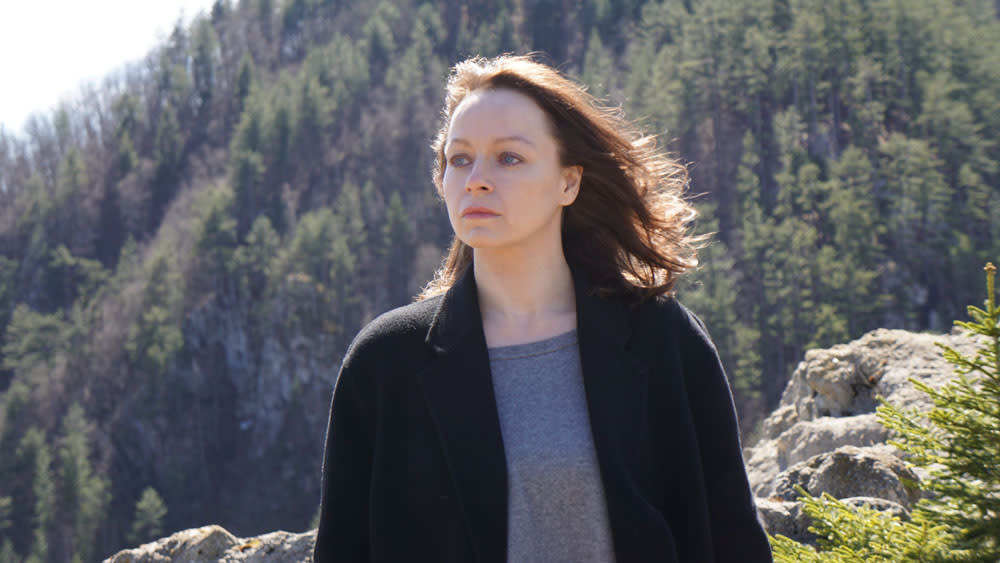Samantha Morton to Scriptwriters: Write More ‘Juicy, Meaty’ Roles for Women

CANNES — British actress Samantha Morton, who has been Oscar nominated twice, said Monday that her role in crime drama series “The Last Panthers” was the best she has ever been given.
Speaking before the world premiere of the series at Mipcom TV market in Cannes, Morton, who earned Oscar nominations for movies “In America” and “Sweet and Lowdown,” said she has turned down numerous offers to star in TV series in the past 20 years, but this role was different.
“Sometimes things choose you as much as you choose them, and I think this is the best part I have ever played; the best character I’ve ever been given,” she said. “And certainly for women, parts like this are just not written — I mean very few and far between – so to be given the opportunity to work with the team that I’m working with and playing Naomi, I felt like the cat that got the cream.”
The series starts with a diamond heist committed by a Serbian gang, and Morton plays an agent working for the insurance company who is brought in to retrieve the jewels by any means possible. Twenty or so years earlier she had been a soldier involved in the Balkans Civil War, and her pursuit of the diamonds brings her back into contact with some of the characters who haunted her past. The series integrates scenes that take her back to that war-time period.
Morton said in Cannes: “Often in scripts … and it happens all the time to me … I’ll read a movie script and I’ll want to play the boy’s part, but I’m not the boy. ‘Oh, damn, okay, the girlfriend, the wife, the whatever.’ Those parts are good too, and I love working, but often the guys get those really juicy, meaty roles, and this was that, in a nutshell.”
She added: “So I got to push myself, not only emotionally, to places that I’d never performed before, but also physically I went through a training regime to play a soldier in Bosnia in the 90s. Guys get to do that sh*t, excuse my language, so it was amazing to be given that opportunity to play someone that has a past such as Naomie’s revisit her today.”
Morton referred to the fact that she came from a military family, so the role had personal resonances for her. “There are so many elements to this drama that are incredibly personal to me, and I have never seen these things written ever. It is very rare. So to be able to get the opportunity to do it in six parts as we have … it is so intelligent and so right that we make this now,” she said.
Morton said that she hadn’t worked on a TV series since “The History of Tom Jones, a Foundling” almost 20 years ago. “Nothing has enticed me to come back. I’ve been offered things… American stuff, and all these things, and nothing enticed me. But this is the best,” she said.
Morton praised the complexity of the script, written by Jack Thorne. “So often the characters have to have a neat tie, a little bow, for the actors to get to – you know, like this journey… and life isn’t like that. We don’t always have the answers, and we might never find the answers. And I love the fact that as a woman you can also play an anti-hero, that you are not necessarily perfect,” she said.
Speaking about her character, Naomie, Morton said: “She hard-core. You wouldn’t mess with her at all, because she has no qualms about getting what she wants. But not in a traditional, manipulative ‘Dallas,’ ‘Falcon Crest’ way. She’s ruthless, but not a manipulative ‘ruthless.’ She’s honest, she’s brutal and there are no gray areas. She gets what she wants, but with truth and focus, and if that truth doesn’t fit with someone’s remit then she can’t have them in her side.” To prepare for the role, Morton undertook military training over a seven-month period.
Director Johan Renck said that it was the production team’s intention to avoid the usual gender stereotypes. “It was really important for all of us to create a main female character that was not like everything else we have seen. The objectification and simplification of the female roles are just ridiculous. Either there is the objectification aspect or the device aspect, where the woman is only there as a device or in a supporting function to the male characters. It was very important from the get-go not to have that, to have a brilliant character who is not gender specific.”
Related stories
Mipcom: ITV Chief Vows to Keep Investing In Content and Production Assets
Mipcom: Upside Distribution Picks Up 'Reset' With Benjamin Millepied
Mipcom: Telemundo-HBO Latin America Unveil Milestone Sales Deal
Get more from Variety and Variety411: Follow us on Twitter, Facebook, Newsletter
